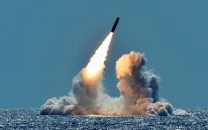Minerals and Afghanistan

What might otherwise be deemed good news has been summarily written-off by the negativity about this troubled land. The dominant narrative is reminiscent of the “great game” discourse of a hundred years ago when Central Asia was considered a competitive playing field for colonial Russia and Britain. Contemporary scholars are tempted by historical comparison to frame the analysis in similar terms between the United States and its Nato Allies versus China. But times have changed and so must our outlook.
The fact that China recently won the tender to develop the Aynak copper mine (near Kabul) is potentially good news for the United States as well. First, this outcome erodes the conspiratorial rhetoric of American designs on Afghanistan as the bidding process led to an outcome which did not favour American firms. The Aynak tender process also revealed how accountability may still be brought forth in an otherwise corrupt country. The former minister of mines, Ibrahim Adel ended up in prison for allegedly accepting a $20 million bribe during the bidding process.
China’s role as a regional power broker and potential mediator in conflict resolution remains strong. The initial negative reaction from the Aynak tender as well as the outcome from the United States needs to be re-evaluated. The terms of the contract according to most international development experts familiar with such contracts are very favourable to Afghanistan in terms of financial arrangements. While there may be some concerns about post-facto environmental and social performance, these can be assuaged by engagement with the Afghan government and civil society in monitoring and enforcement of standards. This February, the Afghan government agreed to join the Extractive Industries Transparency Initiative, which is a rigorous international monitoring mechanism for revenue flows from mineral wealth. Such mechanisms will further strengthen the chances of positive enforcement and monitoring that can strengthen the “social contract” between corporations, foreign investors and the community. The confluence of complementary international interests in mineral development thus has the potential to build trust rather than increasing tensions.
No doubt any optimism must be tempered with cautious planning in a land beset by anarchy. However, natural resource wealth as a primary industrial sector has the potential to transform Afghanistan’s economy with alacrity in a way no other development sector can. Consider what well-managed mineral revenues did to a country like Botswana which rose from being among the poorest in Africa to the wealthiest on the continent within thirty years. The country’s wealth also nourished a nascent democracy and provided for free health care and education for its citizens.
No two countries are created equal but the potential for a positive development path for Afghanistan are more likely with its mineral fortunes. After all, the country’s current economy is dominated by opium which is hardly a worthy alternative. The only way to wean the warlords off the revenues of such a lucrative sector is large-scale capital flows in the economy which mineral revenues can provide. So let's move away from the cynicism that permeates all things Afghan, and consider the mineral bonanza as a potential boon for Pakistan’s bittersweet neighbour.
Published in The Express Tribune, July 21st, 2010.



















COMMENTS
Comments are moderated and generally will be posted if they are on-topic and not abusive.
For more information, please see our Comments FAQ